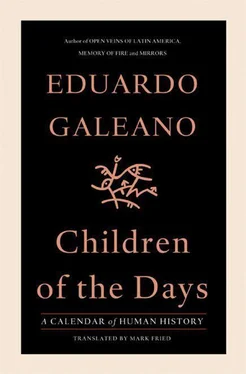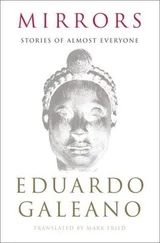“This is our democracy. We bought it. We paid for it. Now it’s time we got behind the wheel ourselves. Vote Murray Hill Incorporated for the best democracy money can buy.”
Many people thought this was a joke.
March 28. MANUFACTURING AFRICA
When it opened in 1932, Tarzan of the Apes drew long lines at the movie houses.
Tarzan’s howl from Hollywood has been the language of Africa everywhere ever since, even though the actor, Johnny Weissmuller, was born in Romania and never set foot in Africa.
Tarzan’s vocabulary had its limits. He only knew how to say, “Me Tarzan, you Jane,” but he swam like no one else, winning five gold medals at the Olympics, and he yelled like no one had ever yelled.
That king-of-the-jungle howl was the work of Douglas Shearer, a soundman who mixed voices for gorillas, hyenas, camels, violins, sopranos and tenors.
Female fans besieged Johnny to the end of his days, begging him to howl.
March 29. THE JUNGLE WAS HERE
Miracle in the Amazon: in the year 1967 a huge gusher of oil erupted in Lago Agrio.
From that moment, and for a quarter of a century, Texaco Petroleum Company sat at the table, napkin at throat, knife and fork in hand, stuffing itself with oil and gas, and shitting eighteen billion gallons of poison on the Ecuadorian jungle.
The Indians had never heard the word “pollution.” They learned its meaning when fish went belly up in the rivers, lakes turned to brine, trees withered on the banks, animals fled, nothing grew in the soil and people were born sick.
Several presidents of Ecuador, all of them above suspicion, collaborated in this undertaking, which earned a chorus of selfless applause from the publicists who praised it, the journalists who celebrated it, the lawyers who defended it, the experts who justified it and the scientists who absolved it.
March 30. INTERNATIONAL DOMESTIC WORKERS DAY IN LATIN AMERICA
Maruja had no idea how old she was.
Of her years before, she said nothing. Of her years after, she expected nothing.
She was neither pretty nor ugly nor indifferent.
She walked with a shuffle, a duster, a broom or a spoon in her fist.
Awake, she buried her head below her shoulders.
Asleep, she buried her head between her knees.
When she spoke, she kept her eyes on the ground, as if she were counting ants.
She had worked in the homes of others for as long as she could remember.
She had never been outside the city of Lima.
Many times she changed houses and she felt at home in none.
At last she found a place where she was treated as a person.
Within a few days, she left.
She was starting to like it.
Today in 1631 John Donne died in London.
This contemporary of Shakespeare’s published almost nothing during his lifetime.
Centuries later, we are lucky to have a few of the verses he left behind.
Like this:
Twice or thrice had I loved thee ,
Before I knew thy face or name .
Or this:
It sucked me first, and now sucks thee ,
And in this flea, our two bloods mingled be .
This flea is you and I, and this
Our marriage bed, and marriage temple is .
April 1. THE FIRST BISHOP
In 1553 the first bishop of Brazil, Pedro Fernandes Sardinha, set foot on these shores.
Three years later, south of Alagoas, the Caeté Indians ate him for lunch.
Some Brazilians are of the opinion that the meal was an invention of the colonial power, a pretext to steal the Caetés’ land and exterminate them in a prolonged “holy war.”
Other Brazilians believe the story occurred more or less as told, that Bishop Sardinha, who carried his fate in his fishy name, was the involuntary founder of the national cuisine.
April 2. MANUFACTURING PUBLIC OPINION
In 1917 President Woodrow Wilson announced that the United States would enter World War I.
Four and a half years earlier, Wilson had been elected as the peace candidate.
Public opinion embraced with the same enthusiasm his pacifist speeches and his declaration of war.
Edward Bernays was the principal author of this miracle.
When the war was over, Bernays acknowledged that he had used doctored photographs and made-up anecdotes to spark prowar sentiment.
This public relations success kicked off a brilliant career.
Bernays went on to advise several presidents and the world’s most powerful businessmen.
Reality is not what it is; it’s what I tell you it is. We can thank him, more than anyone else, for the modern techniques of mass manipulation that can convince people to buy anything from a brand of soap to a war.
In 1882 a bullet pierced the neck of Jesse James. It was shot by his best friend, to collect the reward.
Before becoming the country’s most famous outlaw, Jesse had fought against President Lincoln for the pro-slavery army of the South. When his side lost, he had to change jobs, and Jesse James’s gang was born.
The gang started by pulling off what some say was the very first train robbery in the history of the United States. Wearing their Ku Klux Klan masks, they fleeced every passenger. Then they turned their hand to holding up banks and stagecoaches.
Legend has it that Jesse was something like a Robin Hood of the Wild West, who stole from the rich and gave to the poor, only no one ever met a poor person who received a coin from his hands.
Yet there is no question about his generosity to Hollywood. The movie industry can thank him for forty films, nearly all of them successes, in which stars from Tyrone Power to Brad Pitt have gripped his smoking revolver.
In 1846 Isidore Ducasse was born.
It was wartime in Montevideo and he was baptized by cannon fire.
As soon as he could, he went off to Paris, where he became the Comte de Lautréamont and his nightmares helped give rise to surrealism.
He only dropped into the world for a visit. During his brief life he set fire to language, burned brightly through his words and disappeared in a puff of smoke.
It happened in Africa, in Ife, the sacred city of the Yoruba kingdom, maybe on a day like today or who knows when.
An old man, very ill, brought his three sons before him and announced: “My most cherished things will belong to the one who can fill this room completely.”
And he sat outside to wait while night fell.
One of his sons brought all the straw he could find, but it filled the room only halfway.
Another brought all the sand he could carry, but again half the room was left empty.
The third lit a candle.
And the room was filled.
In certain towns lost in the mountains of Guatemala, anonymous hands sew tiny worry dolls.
A surefire remedy for anxiety, they calm stormy thoughts and come to the rescue when insomnia threatens.
These minuscule worry dolls don’t say a thing. They heal by listening. Huddled under the pillow, they absorb sorrows and regrets, doubts and debts, all the phantoms that undermine a peaceful sleep, and they carry them off, magically far off, to the secret place where night is never an enemy.
April 7. THE DOCTOR’S BILL
Читать дальше













